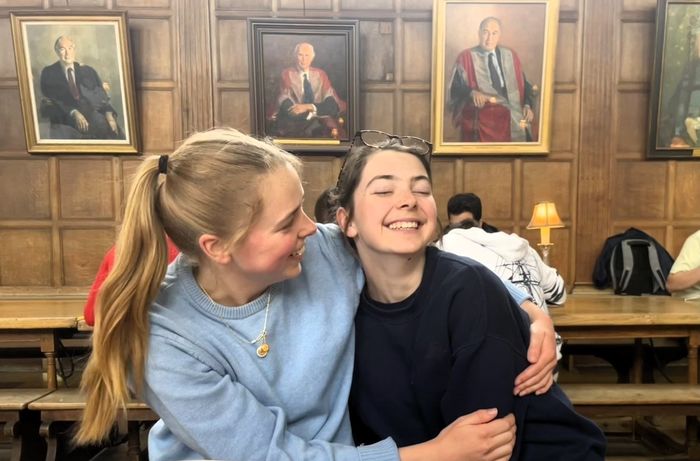On loving your friends: are romantic and platonic love really that different?
Conversations with women at Cambridge about the pressure to date, the line between platonic and romantic affection, and who really matters most

A few weeks ago, a female friend confessed that she would be positively distraught were I to start dating anyone, that anyone in my case likely being a cis-het man. Her mock horror made me laugh. We were, after all, just silly, co-dependent, emotionally unavailable teenagers teasing one another. And yet, perhaps there is a more genuine plea beneath. Life at Cambridge is busy. Life beyond Cambridge is busy, too. I often worry that choosing to love someone means choosing to love someone else a little less.
It is my female friendships that, at times, feel particularly vulnerable. Indeed, love has been most written about by men. Men woo and women are wooed. Women leave other women behind. Ta-dah, heterosexual hegemony triumphs.
“I don’t think romantic relationships need dominate our capacity to love”
Of course, nothing is that simple. I promptly decided to ask every vague acquaintance I know whether they think there is an identifiable difference between romantic and platonic love, and whether they have to be in competition with one another.
My friend Gemma* recounted how she struggled with the line between romantic and platonic forms of affection when she first started dating other women. She felt pressured to differentiate the girl she was seeing from her female friends, deliberately putting her guard up so she didn’t bear her soul in the way she does to her closest female friends. Otherwise, it would seem “too easy”. Must romance be pained and difficult? However, Gemma has since discovered that playing this line between friendship and romance can be joyful. She finds beauty in the fact that “girls know girls”. It is this “rawness” that brings intimacy in her relationship.
I think there is much to gain from modeling how we love romantically on how we commit to others platonically. Over coffee with another friend, Alice, we laughed at how active we both are when it comes to forming friendships. I will admit, I never really fall into friendships. If you are my friend, it is probably because I decided you would be and then determinedly went about wooing you, as it were. I do not consider this stalkerish behaviour. I have always believed in genuinely nurturing your friendships. I don’t think romantic relationships need dominate our capacity to love. I think friendship is the emotional commitment that most overrides the conventional dichotomy of the lover and the beloved, the wooer and the wooed. Might friendship then actually be the most “true” form of love?
“This grey area between platonic and romantic is exactly where she wants her relationship to sit”
My friend Alice is of a similar opinion, explaining that she puts friendship above all else in her relationship with her boyfriend. She actively chooses to give “time, commitment and openness”, and thinks this is especially important as the woman in a heterosexual relationship. Alice wants to love just as much as she is loved, and finds this a means of escaping gendered hierarchies sometimes underlying heterosexual partnerships. Her relationship with her boyfriend almost mirrors those she has with her closest female friends, and this grey area between platonic and romantic is exactly where she wants her relationship to sit. Their friendship is the “basic foundation that stops everything from falling apart”.
Not everyone agreed, however. Whilst Alice views falling in love “hard and fast” as a dangerous illusion, another friend, Tilda, finds that romantic love almost always “hits [her] in the face”. While she is wary of swapping friends for lovers, for her, romantic love is all-encompassing and cannot help but take over. After all, “you can’t cheat on your friends”. What was previously mundane becomes significant by association with just one person. Green is not just a colour anymore—it’s their favourite colour.
But might other kinds of love also have radical, transformative potential? What of loving a god? Loving a community? I personally have always found the most emotional intimacy in my friendships, especially those with women and non-binary people. It is my female friends who teach me the most about true love. I have come to recognise the women in my life as love’s best oracles.
So, I did not exactly uncover a neat answer to my initial question. I still do not know what exactly the difference between romantic and platonic love is. I have, however, realised that we might choose to love a partner the way we love our closest friends. Life is still busy, but there is much time for both.
*Names have been changed
 News / Cambridge students set up encampment calling for Israel divestment6 May 2024
News / Cambridge students set up encampment calling for Israel divestment6 May 2024 News / Cambridge postgrad re-elected as City councillor4 May 2024
News / Cambridge postgrad re-elected as City councillor4 May 2024 News / Proposed changes to Cambridge exam resits remain stricter than most7 May 2024
News / Proposed changes to Cambridge exam resits remain stricter than most7 May 2024 News / Some supervisors’ effective pay rate £3 below living wage, new report finds5 May 2024
News / Some supervisors’ effective pay rate £3 below living wage, new report finds5 May 2024 Fashion / Class and closeted identities: how do fits fit into our cultures?6 May 2024
Fashion / Class and closeted identities: how do fits fit into our cultures?6 May 2024






